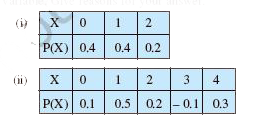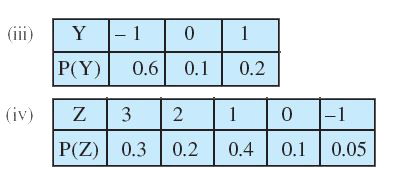Probability of solving specific problem independently by A and B are and respectively. If both try to solve the problem independently, find the probability that
(i) the problem is solved (ii) exactly one of them solves the problem.Solution in Bengali
The correct Answer is:(i) , (ii)
Step by step video, text & image solution for Probability of solving specific problem independently by A and B are (1)/(2) and (1)/(3) respectively. If both try to solve the problem independently, find the probability that (i) the problem is solved (ii) exactly one of them solves the problem. by Maths experts to help you in doubts & scoring excellent marks in Class 12 exams.
Updated on:21/07/2023Topper's Solved these Questions
- PROBABILITYBook:NCERT BANGLISHChapter:PROBABILITYExercise:EXERCISE 3.3
Explore 14 Videos
- PROBABILITYBook:NCERT BANGLISHChapter:PROBABILITYExercise:EXERCISE 3.4
Explore 17 Videos
- PROBABILITYBook:NCERT BANGLISHChapter:PROBABILITYExercise:EXERCISE 3.1
Explore 17 Videos
- MATRICESBook:NCERT BANGLISHChapter:MATRICESExercise:Miscellaneous Exercise on Chapter 3
Explore 15 Videos
- RELATIONS AND FUNCTIONS Book:NCERT BANGLISHChapter:RELATIONS AND FUNCTIONS Exercise:MISCLELLANEOUS EXERCISE ON CHAPTER 1
Explore 19 Videos
Similar Questions
An urn contains 5 red and 5 black balls. A ball is drawn at random, its colour is noted and is returned to the urn. Moreover, 2 additional balls of the colour drawn are put in the urn and then a ball is drawn at random. What is the probability that the second ball is red?
View SolutionState which of the following are not the probability distributions of a random variable. Give reasons for your answer.


View SolutionGiven that E and F are events such that P(E) = 0.6, P(F) = 0.3 and P(E∪F)=0.7, find P(E|F) and P(F|E).
View SolutionLet A=[0100], show that (aI+bA)n=anI+nan−1bA, where I is the identity matrix of order 2 and n∈N.
View SolutionLet f:R→R be defined as f(x)=10x+7. Find the function g:R→R such that gof=f0g=1R.
View SolutionThe probabilities that A and b can solve a problem independently are 13 and 16 respectively. If both try to solve the problem independently, find the probability that:
(i) problem will be solved
(ii) both can solve the problem.
View Solutionएक विशेष समस्या को A और B द्वारा स्वतंत्र रूप से हल करने की प्रायिकताएं क्रमशः 12 और 13 हैं। यदि दोनों स्वतंत्र रूप से समस्या हल करने का प्रयास करते हैं। तो प्रायिकता ज्ञात कीजिए कि
(i) समस्या हल हो जाती है
(ii) उनमें से तथ्यतः कोई एक समस्या हल कर लेता है।
View Solutionएक विशेष समस्या को A और B द्वारा स्वतंत्र रूप से हल करने की प्रायिकताएँ क्रमश: 12 और 13 है | यदि दोनों, स्वतंत्र रूप से, समस्या हल करने का प्रयास करते है, तो प्रायिकता ज्ञात कीजिए कि
(i) समस्या हल हों जाती है
(ii) उनमे से तथ्यतः कोई एक समस्या हल कर लेता है |
View SolutionProbability of solving problem independently by A and B are respectively. If both try to solve the problem independently, find the probability the problem is solved.
View Solutionएक विशेष समस्या को A और B द्वारा स्वतंत्र रूप से हल करने की प्रायिकता क्रमश 1 /2 व 1 /3 है यदि दोनों स्वतंत्र रूप से समस्या को हल करने का प्रयास करते है तो प्रायिकता ज्ञात कीजिए कि - समस्या हल हो जाती है
View SolutionThe probability of solving a specific problem independently by A and B are 13 and 15 respectively. If both try to solve the problem independently, find the probability that the problem is solved.
View SolutionA and B try to solve the problem independently. The probability that A solves the problem is 12 and that B solves the problem is 13. Find the probability that :
(a) Both of them solve the problem
(b) The problem is solved.
View SolutionThe probabilities of A and B solving a problem independently are13and14respectively. If both of them try to solve the problem independently, what is the probability that the problem is solved?
View SolutionA and B try to solve a problem independently Probability that A solves the problem is 13 and that B solves the problem is 14. Find the probability that
i. Both of them solve the problem.
ii. The problem is solved.
View SolutionProbability of solving specific problem independently by A, B and C are 12,13and15 respectively. If all of them try to solve the problem independently then find the probability that problem will be solved.
View SolutionProbability of solving specific problem independently by A and B are 12 and 13 respectively. If both try to solve the problem independently find the probability that exactly one of them solve the problem.
View Solution

